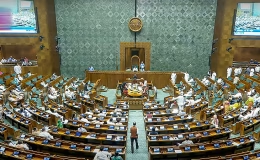Media Release: For Immediate Release 22 May 2018
High profile Tibetan rights activist Tashi Wangchuk sentenced to five years, despite committing no crime.
Tibetans and Tibet campaigners express outrage and vow to continue to press for his release at highest level.
After over two years in detention Chinese authorities have today sentenced Tibetan language advocate,Tashi Wangchuk, to five years’ imprisonment [1] on politically motivated charges of ‘inciting separatism’ after he publicly sought to realise his right to Tibetan language education. [2] Tashi has already spent over two years in Chinese detention despite the fact that he has committed no crime under both international law and that of the Chinese constitution. He is now not due to be released until January 2021.
Tashi Wangchuk, a 33-year old Tibetan shopkeeper, was detained on 27 January 2016 and his trial took place on 4 January 2018 at Yushu Intermediate People’s Court, in Jyekundo County in the Kham region of Tibet (Ch: Yushu Tibetan Autonomous Prefecture, Qinghai Province). [3] Tashi’s lawyers, who had limited access to him during his pre-trial detention, reported that he was tortured and suffered extreme inhuman and degrading treatment during the first week of detention. He was initially held for a lengthy period in a ‘tiger chair’ where he was subjected to arduous interrogation and was repeatedly beaten. His interrogators also threatened to harm his family. [4] Due to China’s secrecy around the announcement of trial outcomes, his lawyers were unable to be in court today.
Tashi Wangchuk’s detention came after he featured in a New York Times article and video report [5] about his journey to Beijing in May 2015, to file a formal complaint against Chinese officials for failing to support Tibetans’ right to Tibetan language education. Despite the fact that he explicitly stated in the report that he was not calling for Tibetan independence, Tashi Wangchuk was arrested and charged with the highly politically motivated ‘offence’ of “inciting separatism”, a charge that “criminalize(s) the legitimate exercise of freedom of expression and his defense of cultural rights”, according to UN experts. [6]
Tashi Wangchuk is a high profile political prisoner whose case has been raised by multiple governments [7] and independent human rights experts. In March 2018 six UN human rights experts expressed serious concern over the ruling by a Chinese court to uphold charges of “incitement to separatism” and called for all charges levelled against Tashi Wangchuk to be dropped. [8] In January 2018, government delegations from the UK, EU, US, Germany and Canada attempted to attend the trial but were all denied access. [9] Court officials also refused to allow a New York Times reporter into the trial, despite several requests.
“Tashi Wangchuk’s sentence is a complete outrage and his trial a travesty of justice,” said Tenzin Jigdal, International Tibet Network. [10] “He has already lost over 2 years of liberty and now won’t be free until January 2021 because he has been criminalised for shedding light on China’s failure to protect the basic human right to education and for taking entirely lawful steps to press for Tibetan language education. We urge governments to make strong, urgent representations to China, calling for Tashi Wangchuk’s immediate and unconditional release.”
“The harshness of this sentence makes it blatantly clear that China has no respect whatsoever for the rule of law. Tashi Wangchuk is an innocent man and his actions to date have not infringed Chinese criminal law, let alone amounted to an internationally recognisable criminal offence,” said Eleanor Byrne-Rosengren, Director, Free Tibet. “In condemning him to five years in prison, China is sending a message to those under their rule, and to the international community, that they do not care about the rule of law, justice or international standards – they have made it clear that they intend to clamp down on anyone who says or does anything they don’t like.”
“What we see from today’s trial outcome is the true face of China’s racist policies against Tibetans. It doesn’t matter to China if you play by the rules – as long as you’re Tibetan, you can be framed as a “separatist” and detained and tortured for advocating for something as basic as language rights,” said Dorjee Tseten, Executive Director of Students for a Free Tibet.
““Tashi Wangchuk is the victim of a politically motivated prosecution. Today’s sentence demonstrates the Chinese authorities ruthless attempts to quash all forms of peaceful dissent – even if it entails flouting their own laws in the process,” said Gloria Montgomery, Head of Advocacy and Campaigns, Tibet Society. “It is utterly shameful that Tashi Wangchuk is forced to spend a further two years and 8 months behind bars simply for calling for the rights of Tibetans to be educated in their native tongue.”
“Tashi Wangchuk has shown incredible courage in his battle to progress the fundamental rights of the Tibetan people,” said Mattias Bjornerstedt, Swedish Tibet Committee “China has demonstrated today just how much it regards such courage as a threat, by imposing a long, politically-charged sentence on an innocent man.”
“Tibetans and campaigners are outraged at China’s cowardly sentencing of a Tibetan acting entirely within the Chinese Constitution,” added Kyinzom Dhongdue, Executive Director, Australia Tibet Council. “We will continue to press at the highest levels for governments to call on China to overturn this sentence. Tashi has committed no crime and his imprisonment is a perversion of international law.”
Tashi Wangchuk was awarded the International Tibet Network’s ‘Tenzin Delek Rinpoche Medal of Courage’ in July 2017; an annual award given to Tibetan human rights defenders who show deep commitment to enhancing the freedom and rights of the Tibetan people at great personal risk. [11]
CONTACTS:
Tenzin Jigdal, International Tibet Network | +91 98822 55516 | jigdal@tibetnetwork.org
Eleanor Byrne-Rosengren, Free Tibet | +44 (0)7387 182260 | eleanor@freetibet.org
Gloria Montgomery, Tibet Society, UK | +44 (0)7377890148 | advocacy@tibetsociety.com
Dorjee Tseten, Students for a Free Tibet | +1 6467533889 | Dorjee@studentsforafreetibet.org
Kyinzom Dhongdue, Australia Tibet Council | +61 (0)416 695 590 | kyinzom.dhongdue@atc.org.au
Mattias Bjornerstedt, Swedish Tibet Committee | +46 707992915 | mattias.bjornerstedt@tibet.se
Notes To Editors:
[1] Tashi Wangchuk’s lawyer, Liang Xiaojun, posted on Twitter at 12.10pm [Beijing] on 22 May 2018, ‘刚刚得到消息:扎西文色以煽动分裂国家罪被判处有期徒刑五年。”. Machine Translation – “Just got word, [Tashi Wangchuk] was sentenced to five years in prison for inciting secession.” https://twitter.com/liangxiaojun/status/998778003269210114
[2] Chinese policies that undermine education in the Tibetan language run counter to provisions in China’s own laws, specifically the Regional Ethnic Autonomy Law; protections for language and culture included in Chinese law are routinely not implemented in Tibet. These policies also violate the international right to cultural rights of Tibetans living under Chinese rule. See more on pages 11-15 of the Human Rights Action Plan for Tibet – https://drive.google.com/open?id=1x_iVpWTGgoQRjQx6WMp4UYxzFy4b3LKy
3] On 4 January lawyer Liang Xiaojun, tweeted, “The trial of Tashi Wangchuk in the crime of inciting separatism has ended, which took 4 hours from 9:30 to 13:30. The judge announced the court to be closed and the day of sentence will be chosen afterward. The trial was conducted in Mandarin, and the video “A Tibetan’s Journey to Justice” was screened to the court as evidence. Other related evidence was also shown. The prosecution, the defense and Tashi Wangchuk himself have all expressed their points of view. Tashi’s expression was very clear and his views were concise.” https://twitter.com/liangxiaojun/status/948796514200993793
[4] Background Briefing 2017: Tibetan human rights defender Tashi Wangchuk, International Tibet Network, https://docs.google.com/document/d/1V42KWh8A1MxcSYTaJyMP2v1mhZGwa9qHlj7i9ESCnDs/
[5] New York Times: “A Tibetan’s Jouney for Justice” https://www.nytimes.com/video/world/asia/100000004031427/a-tibetans-journey-for-justice.html
[6] Communication to China from five UN Special Rapporteurs, José Antonio Guevara Bermúdez Vice-Chair-Rapporteur of the Working Group on Arbitrary Detention Karima Bennoune Special Rapporteur in the field of cultural rights 6 David Kaye Special Rapporteur on the promotion and protection of the right to freedom of opinion and expression Rita Izsák-Ndiaye Special Rapporteur on minority issues Nils Melzer Special Rapporteur on torture and other cruel, inhuman or degrading treatment or punishment, 10 February 2017, https://spcommreports.ohchr.org/TMResultsBase/DownLoadPublicCommunicationFile?gId=22981
[7] EU Beijing Delegation Statement: https://www.gov.uk/government/world-location-news/eu-delegation-to-china-statement-on-international-human-rights-day and US Beijing Embassy Statement: http://beijing.usembassy-china.org.cn/mobile/ambassador-human-rights-day-statement-2016.html
[8] Statement by six UN experts: Mr. Philip Alston, Special Rapporteur on extreme poverty and human rights; Mr. Michel Forst, Special Rapporteur on the situation of human rights defenders; Mr. David Kaye, Special Rapporteur on the promotion and protection of the right to freedom of opinion and expression; Mr. Diego García-Sayán, Special Rapporteur on the independence of judges and lawyers; Mr. José Antonio Guevara Bermúdez, Chair-Rapporteur of the Working Group on Arbitrary Detention, and Mr. Bernard Duhaime, Chair-Rapporteur of the Working Group on Enforced or Involuntary Disappearances.; and furhter endorsed by Dainius Pūras, Special Rapporteur on the right to health, 23 March 2018, https://spcommreports.ohchr.org/TMResultsBase/DownLoadPublicCommunicationFile?gId=22981.
[9] https://www.nytimes.com/2018/01/04/world/asia/tibet-china-language-separatism-tashi.html
[10] International Tibet Network is a global coalition of 180 Tibet Groups working to end the human rights violations in Tibet and restore the Tibetan people’s right under international law to determine their own political, economic, social, religious, and cultural status – www.TibetNetwork.org
[11] Tibetan rights advocate Tashi Wangchuk awarded the 2017 ‘Tenzin Delek Rinpoche Medal of Courage’ http://www.phayul.com/news/article.aspx?id=39283




